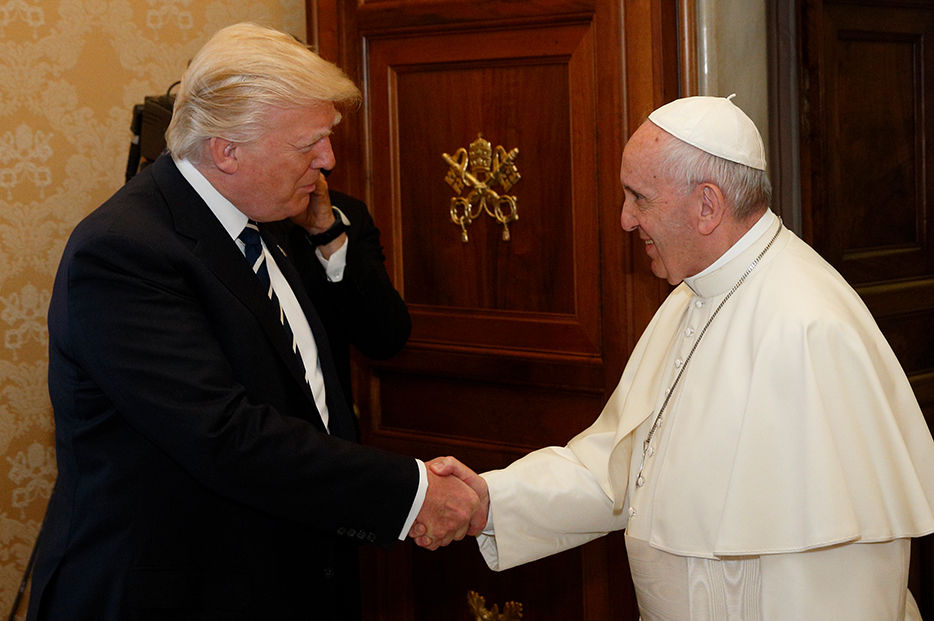The cordial meeting between Pope Francis and President Donald Trump in Rome in late May included the traditional exchange of gifts. Trump gave the pontiff a boxed set of books written by Martin Luther King, an American icon that the pope often quotes. In return the pope gave the president a medallion and three of his own works, including “Laudato Si’,” his encyclical on the environment. Trump, quite visibly affected by his t√™te-à-t√™te with Pope Francis, indicated he would read them.
I do hope that’s true, for a man with such power to influence world affairs ought to read “Laudato Si’” — whatever might be his position on the contentious issue of climate change. The encyclical does not seek to settle the question of climate variability and what, if anything, should be done about it. Instead, and more importantly, it rethinks and resets environmentalism within a broader and more human framework than we are used to from the environmental movement — a framework that is sure to resonate with Trump, who has already set some policies well in sync with the pope’s philosophy.
For “Laudato Si’” is actually an analysis of the brokenness of our modern culture — one that fundamentally misunderstands the way we ought to relate to nature, but also, and just as importantly, to each other. As Pope Francis puts it, our lives ought to be “grounded in three fundamental and closely intertwined relationships: with God, with our neighbor and with the earth itself.” Grounding ourselves, instead, in the pursuit of material goods and power results in a dysfunction whose signs are all around us — not just in the pollution of our common home, Earth, but in the fragmentation of our families, our loneliness and our indifference to the needs and suffering of others.
If we, instead, attend to what’s important — trying to live in right-relationship with God and our fellow man, and appreciating nature as a generous gift from the Creator — our culture can be mended. As the pope puts it in the encyclical: “We must regain the conviction that we need one another, that we have a shared responsibility for others and the world, and that being good and decent are worth it. We have had enough of immorality and the mockery of ethics, goodness, faith and honesty. It is time to acknowledge that light-hearted superficiality has done us no good.”
“Laudato Si’” does emphasize our shared responsibility for the world and addresses the ecology, but, more broadly, the human ecology. The “environmentalism” Pope Francis proposes is different from the one we are used to. It is one that reminds a world obsessed with the renewability of energy and the temperature of the air that nature is a generous gift created for our delight and sustenance. And, very importantly, that human beings themselves are a fundamental part of nature, and demand the same respect and protection as do her rainforests and oceans. This thinking protects us from a common mistake of the environmental movement, which is to deny the preeminence of the human person. As the pope points out: “More zeal is shown in protecting other species than in defending the dignity which all human beings share in equal measure.”
Defending and promoting the dignity of men and women needs a central aim of environmental efforts. This is especially important when considering the relationship between rich and poor nations. When Trump reads in “Laudato Si’” about the proper attitude of affluent nations to the developing world, he will find ample accordance with his reinstatement and extension of the Mexico City policy. The pope writes movingly about the fact that many environmentalists have only one idea when it comes to solving the problem of poverty: population control. Too much U.S. aid to developing nations has been tied up with programs that promote abortion, which fragments family ties that are vital to the poor and also unjustly deprives them of their children. Cutting off aid to programs that promote abortion, as the Mexico City policy does, is a way of hearing, as the pope writes, “both the cry of the earth and the cry of the poor.”
Trump deciding not to uphold international climate accords made by the previous administration is not, in the end, as important as whether he understands that the problems that beset our natural ecology are inseparable from our social problems. Nature means not just the environment but also sexuality, social relationships and the family. The way we pollute Earth and treat her as just another means to achieve our ends is simply a symptom of the way humans have ceased to uphold universal values, instead setting themselves up as dictators who can even mold reality to their desires.
Reading “Laudato Si’” will connect the dots between caring for Earth and caring for the human beings that inhabit her. Because, as Pope Francis writes, “When we fail to acknowledge as part of reality the worth of a poor person, a human embryo, a person with disabilities … it becomes difficult to hear the cry of nature itself.”

